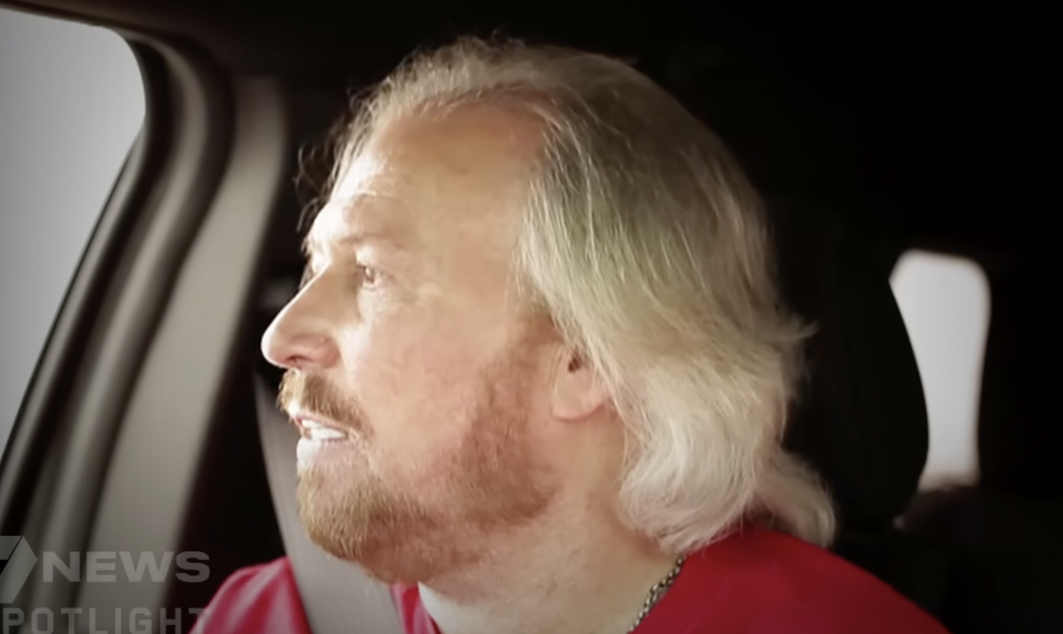
In a poignant and emotional interview, Barry Gibb, the last surviving BeeGee, opens up for the first time following the devastating loss of his brother Robin. The interview offers a raw and intimate glimpse into his life, the incredible journey of the Bee Gees, and the profound agony of outliving his three brothers. Far removed from the dazzling spotlight and global superstardom, Barry reveals himself as a man grappling with enormous loss, navigating a complex family dynamic, and finding his only solace in music and family bonds.
This deeply personal interview inspired Barry to compose a new song, “The End of the Rainbow,” a heartfelt tribute to Robin. The lyrics echo sentiments of peace and acceptance, stating, “Today is tomorrow, winters are summers, and the end of the rainbow is here.” These words carry the weight of hindsight and sorrow, heavily laden with the wisdom of encouraging Robin to “stop, sit down and enjoy” the rewards of their monumental journey.
Barry reflects candidly on the bittersweet success of the Bee Gees, revealing a shattered heart burdened by a profound regret: all his brothers were lost during periods of conflict or strained relations. The pain of being estranged at their final moments haunts him. Being the “last man standing” is a heavy reality that Barry, as the eldest brother, struggles to comprehend and accept.
Born in humble beginnings in Manchester, England, Barry recounts their family’s brave migration to Redcliffe, Australia in 1958 as “ten pound poms” chasing a dream. He fondly calls Australia “my country” and the birthplace of his artistic spirit. Their youthful ambition shone through makeshift microphones fashioned from tin cans, signs of an early passion for music.
The Bee Gees’ ascension in London was aided by the legendary management team behind The Beatles. A clever marketing stunt saw their first single released anonymously in America, sparking speculation that it could be The Beatles themselves, creating a buzz that launched their fame. Their iconic hit “Massachusetts” emerged as a sharp commentary on the fleeting nature of the flower power era.
Barry also shares touching memories of their father’s stern influence, especially his demand that the boys always smile on stage despite his own emotional struggles. This lack of praise fueled their relentless pursuit of approval and success.
The mid-70s marked a dramatic change with the Bee Gees’ move to Miami, right as the disco era exploded. This era created a whirlwind of unprecedented global fame soaked in frenzy and constant fan attention. Barry recalls their unique songwriting process, often beginning with a melody that would slowly ferment before the lyrics would come to life.
The Bee Gees didn’t just appear on music charts; they dominated them, holding several top ten hits simultaneously. Barry’s songwriting prowess extended beyond the group, collaborating with legendary artists like Barbra Streisand, whom he regards with a mixture of affection and awe due to her formidable passion.
A defining feature of their sound, the iconic Bee Gees falsetto, was a natural discovery as they pushed for high notes. Barry credits Robin’s fiery ambition as the driving force behind their success but reveals his own desire to avoid the trap of feeling fully “made it,” to retain a humble outlook.
Beyond the music, Barry fondly recalls his friendship with Michael Jackson, sharing lighthearted stories and Jackson’s amusing wariness about others wanting his music.
For Barry, despite monumental professional success, family remains his greatest achievement—his children, grandchildren, and a steadfast marriage of 45 years with his wife Linda built on laughter and mutual support.
The mystical, almost telepathic bond shared by the Gibb brothers is a poignant thread throughout the interview. Barry speaks heartbreakingly about missing the unifying connection he had with Robin, Maurice, and Andy, especially as their deaths—Maurice’s sudden passing within 48 hours after falling ill, Andy’s in 1988, and Robin’s recent passing just four months before the interview—left him grappling with deep sorrow and loneliness.
Returning to Australia for a tour, Barry will share not only his music but also cherished home movies and childhood stories from Redcliffe, including their momentous decision to abandon a troubled path and pursue music instead. A walkway in Redcliffe will stand as a lasting tribute to the Bee Gees, a powerful symbol of both triumph and loss that overwhelmed Barry with emotion.
Performing now feels profoundly different but Barry senses the presence of his brothers on stage through the music and treasured memories. Despite familial disagreements, he emphasizes the joy and fun they shared. This interview serves as a cathartic release, allowing Barry to unload emotions that have long remained unspoken since Robin’s death, giving us a glimpse of the enduring pain behind the legend of the Bee Gees.